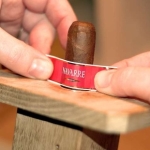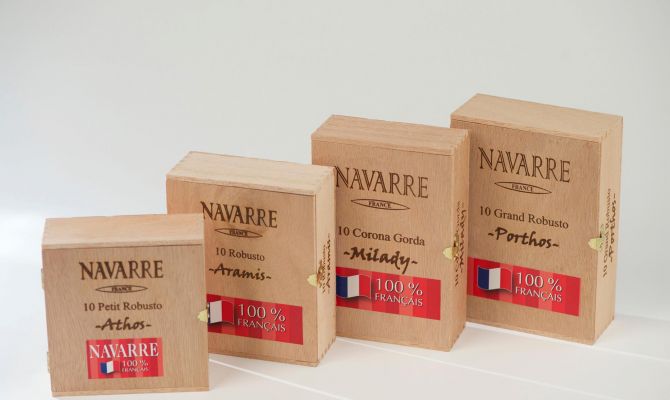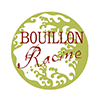 Vous connaissez sans doute la belle expression française « de France et de Navarre » qui trouve son fondement étymologique dans l’incroyable histoire de distance géographique qui lie ces deux pays par les dynasties royales française. Or celui-ci ne sera définitivement rattaché au territoire national que bien tard, au XVIIIème siècle. Et pourtant, si l’on cherche à fumer des cigares entièrement issus des sols de la patrie, c’est bien dans cette région qu’il faut se rendre, plus précisément dans la ville de Navarrenx, qui héberge la fabrication des cigares.
Vous connaissez sans doute la belle expression française « de France et de Navarre » qui trouve son fondement étymologique dans l’incroyable histoire de distance géographique qui lie ces deux pays par les dynasties royales française. Or celui-ci ne sera définitivement rattaché au territoire national que bien tard, au XVIIIème siècle. Et pourtant, si l’on cherche à fumer des cigares entièrement issus des sols de la patrie, c’est bien dans cette région qu’il faut se rendre, plus précisément dans la ville de Navarrenx, qui héberge la fabrication des cigares.
L’histoire de cette entreprise est pleine de surprises, et apparaît comme un conte de fée pour les amateurs de tabac français. En effet, la manufacture, qui à toujours tablé sur un roulage manuel des cigares, était en dépôt de bilan lorsqu’elle a été reprise par Thierry Frontère, un enfant du Béarn ayant fait toute sa carrière à Paris. Dans l’optique de passer sa retraite sur ses terres natales, celui-ci rachète les murs et la marque, et donne une nouvelle orientation à la fabrique, afin d’assurer une pérennité financière à l’entreprise. Il commence par donner des primes aux « rouleuses », dont la majorité est d’origine française, et qui peinaient jusque là à suivre le rythme des trois « torcedoras » cubaine, employées sur place, et formatrice de l’ensemble de l’équipe. De plus il développe son réseau de distribution en passant par un réseau de commerciaux professionnels, ce qui permet de trouver les fameux cigares chez un grand nombre de revendeurs, partout sur le territoire.
Afin d’assurer également le prestige mérité par la tradition artisanale qui règne dans leur manufacture d’origine, les cigares Navarre disposent désormais d’un « Club » de passionnés, et sont largement disponible à l’export. Ce qui ne fait rien perdre au charme de ce produit d’exception, dont les critiques ne tarissent pas d’éloges. L’ancrage territorial fut si bien réussi que depuis plus d’un an, la manufacture abrite un musée dans ses locaux, assez grand pour accueillir des cars de touristes à la recherche de l’histoire française du tabac brun.
Navarre Cigars:
There is a lovely old French expression, “from France and from Navarre” (meaning “from all over the place”), whose etymological roots go back to the vast geographical distance between the old kingdoms of France and Navarre, linked nonetheless by the French royal dynasties of the time. Navarre was not definitively merged with the nation of France until quite late, in the 18th century, and yet, if you wish to smoke cigars produced entirely on French soil, it is this region – and more precisely, the town of Navarrenx, where the cigar factory is located – that you need to visit.
The company’s history is so full of twists and turns that it is seen as a kind of fairy-tale by French tobacco aficionados. The factory, which has always produced hand-rolled cigars, was actually in the middle of solvency proceedings when it was taken over by Thierry Frontère, who was born in Béarn and who had spent the whole of his working life in Paris. Determined to spend his retirement in the place he called home, he bought the premises and the brand, and set the factory in a new direction in order to ensure the company’s financial stability. He started by granting bonuses to the “rollers”, mostly French women, who had hitherto struggled to keep up with the three Cuban torcedoras” who were employed in the factory to train the entire team. He also worked with professional sales associates to develop the distribution network, which resulted in the famous cigars becoming available from a great many retailers all over France.
In order to generate the prestige worthy of a production company that had used traditional artisanal methods since its beginnings, he also set up a “Club” for Navarre enthusiasts and made the cigars widely available for export. Neither of these moves detracted from the charm of this exceptional product, of course; the critics’ constant accolades bear testimony to that. The reinforcement of the brand’s regional identity, meanwhile, has been so successful that, for over a year now, the factory has housed a museum large enough to welcome busloads of tourists on the hunt for the story behind the famous dark tobacco from France.
Didier MOINEL DELALANDE








